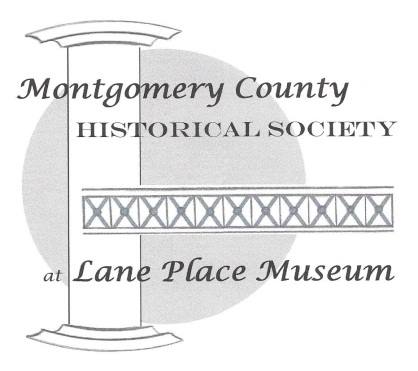from Apr. 23, 1865
Letter to John Yarick from Reuben Yarick, April 23, 1865
-
Full Title
Handwritten Letter to John Yarick from his brother, Reuben Yarick, April 23, 1865
-
Description
Handwritten letter from Reuben Yarick, at Washington, D.C., to his brother, John Yarick, in Suffield, Portage County, Ohio. The letter describes Reuben's fears and feelings about the assassination of President Lincoln and visiting his body in the White House. This letter is part of Papers of John Yarick, 1854-1864. Reuben enlisted in Company G, 1st Michigan Infantry as a Sergeant on July 2, 1861 at Jackson (Mich.) age 25. He was wounded in action in 1864 and hospitalized at the U.S. Hospital, Hampton, Virginia. He was discharged from Company B, 24th VRC at Washington, D.C., on July 28, 1865. (This information is from Reuben's service record.)
-
Transcription
Page One
Washington, D. C., Aprl 23, 1865
Ever Dear Brother
Yours of the 16th is before
me and I am happy indeed to hear that
you are getting well again and your
family is recovering from its affliction
John I wrote a letter to you I think [inserted: two weeks ago]
that you have received it before this
time but I will write you a short
letter this evening yes John President
Lincoln is dead and you and [crossed out illegible words]
his remains are on it[sic] way to its last
resting place in the far west Springfield
Illinois they left here at eight -oclock
this [crossed out] yesterday morning I seen his
boddy [sic] at the White House last tuesday
or Wedensday [sic] it was conveyed to the
Capital the crowd of People was great the
procession was large and on thurday [sic]
his boddy [sic] lay in State at the Capital [sic]
and an emence [sic] swarm of People was
Page Two
their [sic] all day to get a last glimpse
of the once famous ruler of these
United States and our unhappy country
I went on Guard yesterday morning
at the old capital Prison and came
off this morning in the Prison nothing
but Rebel Prisoners of war are
confined and mostley [sic] all Rebell [sic]
officers from Second Lieutenant
to Generals and what little
opportunity that I had to speak to
them they all felt sorry and sayed [sic]
that to their opinion that the best
man for peace had gone and
did not think that the so called
Confederate Government had eneything [sic]
to do with the assassination and
was afraid that we would use them
pretty ruff [sic] we have allays [sic] used
prisoners of war well and I thing [sic]
that we allways [sic] will as long as they
will behave themselves two hundred
of these was sent off this morning
Page Three
for Johnson Island Ohio one Gen
was with the lot Gen Payn was
his name those two hundred was
all Officers.
Well John I don't know that i have
much more to write this time
their [sic] is a rumor now that the
V.R.C. will be mustard [sic] out soon
and if they do I will get out of the
Service but if the war continues
I will get in the Cavlrey [sic] if I can
I have one good arm yet and I can
fight it out had thought to quit
when I got out but this last cowardly
murder is enough to arouse evrey [sic]
Patriot's heart and fight as long as
he can raise an arm
Hoping that this will finde [sic] you
all well as it leaves me I will close
for this time my health is good at
present Remain as ever your
Devoted Brother
Sergt. Reuben Yarick
-
Source
Clarke Historical Library, Central Michigan University, John Yarick Papers, 1854-1864
-
Rights
This item may be reproduced and used for any purpose, including research, teaching, private study, publication, broadcast or commercial use, with proper citation and attribution.
-
Tags
-
Cite this Item
Yarick, Reuben. "Handwritten Letter to John Yarick from his brother, Reuben Yarick, April 23, 1865". Remembering Lincoln. Web. Accessed December 16, 2025. https://rememberinglincoln.fords.org/node/847
-
Creator
Yarick, Reuben
-
Date
1865
-
Material
Letter
-
Dimensions
8x10 inches
from Apr. 23, 1865
Handwritten Letter to John Yarick from his brother, Reuben Yarick, April 23, 1865
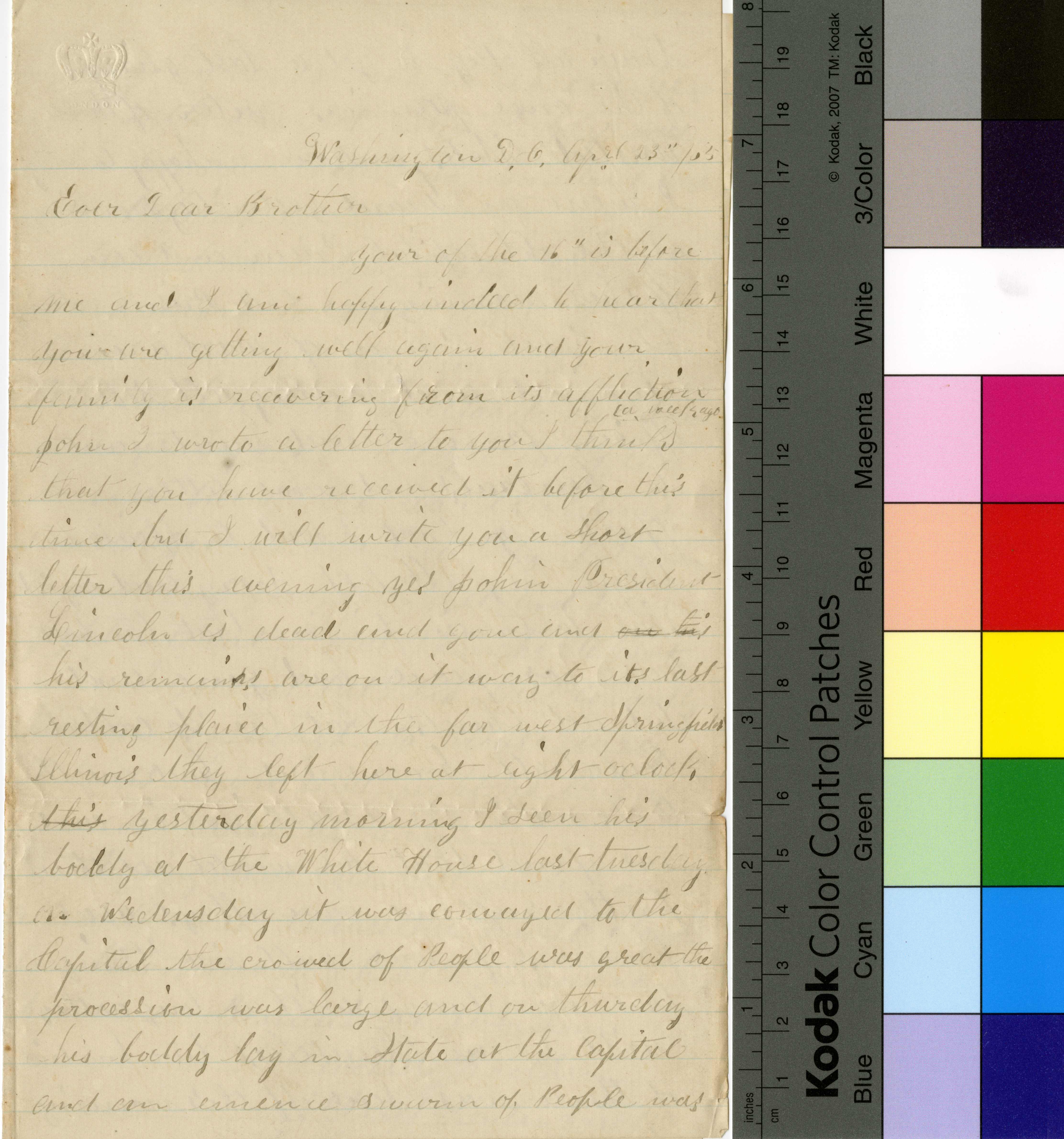
-
Description
Handwritten letter from Reuben Yarick, at Washington, D.C., to his brother, John Yarick, in Suffield, Portage County, Ohio. The letter describes Reuben's fears and feelings about the assassination of President Lincoln and visiting his body in the White House. This letter is part of Papers of John Yarick, 1854-1864. Reuben enlisted in Company G, 1st Michigan Infantry as a Sergeant on July 2, 1861 at Jackson (Mich.) age 25. He was wounded in action in 1864 and hospitalized at the U.S. Hospital, Hampton, Virginia. He was discharged from Company B, 24th VRC at Washington, D.C., on July 28, 1865. (This information is from Reuben's service record.)
-
Source
Clarke Historical Library, Central Michigan University, John Yarick Papers, 1854-1864
-
Rights
This item may be reproduced and used for any purpose, including research, teaching, private study, publication, broadcast or commercial use, with proper citation and attribution.
-
Creator
Yarick, Reuben
-
Date
April 23, 1865
-
Material
Letter
-
Dimensions
8x10 inches
from May. 4, 1865
Edgar Lincoln Letter
-
Full Title
Edgar Lincoln Letter
-
Description
This letter from Edgar to his brother and sister discussing his recent activities near St. Paul, Minnesota, including the assassination of President Lincoln. Edgar notes that the news of Lincoln's death has stunned the local populace. Edgar goes on to note that he is willing to follow his brother in regards to management of land they hold in Minnesota, that he feels may drive him into debt.
-
Transcription
Thursday Eve,
St. Paul May 4, 1865 -
Dear Bro. & Sister
Your letter of April 25, I have just received. as it went to
Shakopee I did not get it quite so soon. I was very glad to hear from You, and am
rejoiced to know that you have returned in Safty. A letter from Augusta a few days
since informed me of Your being at Brewster and of Your good health. Isaac and
family are all well, or were Monday Morning. I left S - with about 400 Bbls lime
the 26 . April. put of 70 Bbls at the Fort. and have sold about 140 here. it goes
of very slow now and I dont know what to make of it, as it was generally supposed
this spring that there was going to be a good deal of building down here this year .
The news of the Murder of our good President has knocked every thing in head, and
people do not like to do any thing until they know how things are going to turn
out. I have brought down 720 Bbls before this trip, which sold for $1.50 per Bbl,
most of which we got the money for. Since I have been here this time Reice has been
here and made contract with most of the large masons to furnish them with lime for one
Year at $1.10 and so we shall have opposition again to contend with. He is a d - - d
jackass, but like all the rest of the Dutchmen here afraid that we shall make any thing.
With wood, labor, and every thing else at high as it is now, our lime costs us 86 cts
here . How long the d - - d fool will hold out against us or wheather it will be for
our interest to burn, or sell out the whole concern Isaac and I have not decided yet.
Isaac is getting about discouraged as well as myself, and it is no wonder that we do.
I feel made enough to work this summer for nothing, more than a living and if
Isaac has not such a large family I should want him to, and give Reice fitts.
I shall send Isaac Your letter tomorrow and let him answer You in regards to buying
Your part. As I have no desire to run in debt to possess more property in this
place I should be glad to take $1000, for my interest in the concern, on the same
terms that you offer yours. I shall write Isaac to answer You immediately at Boston
care of Crosby.
I would not go in the Bark again if they would not give me more
wages, but get a vessel and go the same as Allison does. I should have probably
been in Calcutta now, but Augusta was not well enough to go with me and as we have
but one life to live here we thought we might as well be together once in a while,
or try to be at any rate, as it is I dont know as we shall as Father Snow is so unwell.
I think it her duty to stay at home, at present, I suppose that I can bear
the cross, but think that all of us have had our share of them. I am very sorry that
Lucinda has a cough and hope that she will take good care of herself. I hope that
Free will come home from Spain, I am writing in the Cabin of the old flat Boat. and
expect to make it my home here until the misquitoes come. Shall try and not let the
faithfull old boat sink. Write on receipt of this to S - Tell Anthony that I am hearty
and hope that he is the same, and when he wants a mate to let me know. Give my love to
Mother and all enquiring friends. Please dont let the contents of this letter get out
much in Brewster, as it would be nuts for those busy bodies, and I dont intend to
furnish them any without paying for them with my best wishes for your good health
and prosperity, Freeman Your aff. Bro. Edgar -
Source
-
Rights
This item may be reproduced and used for any purpose, including research, teaching, private study, publication, broadcast or commercial use, with proper citation and attribution.
-
Tags
-
Cite this Item
Edgar Lincoln. "Edgar Lincoln Letter". Remembering Lincoln. Web. Accessed December 16, 2025. https://rememberinglincoln.fords.org/node/845
-
Creator
Edgar Lincoln
-
Date
May 4, 1865
from May. 4, 1865
Edgar Lincoln Letter
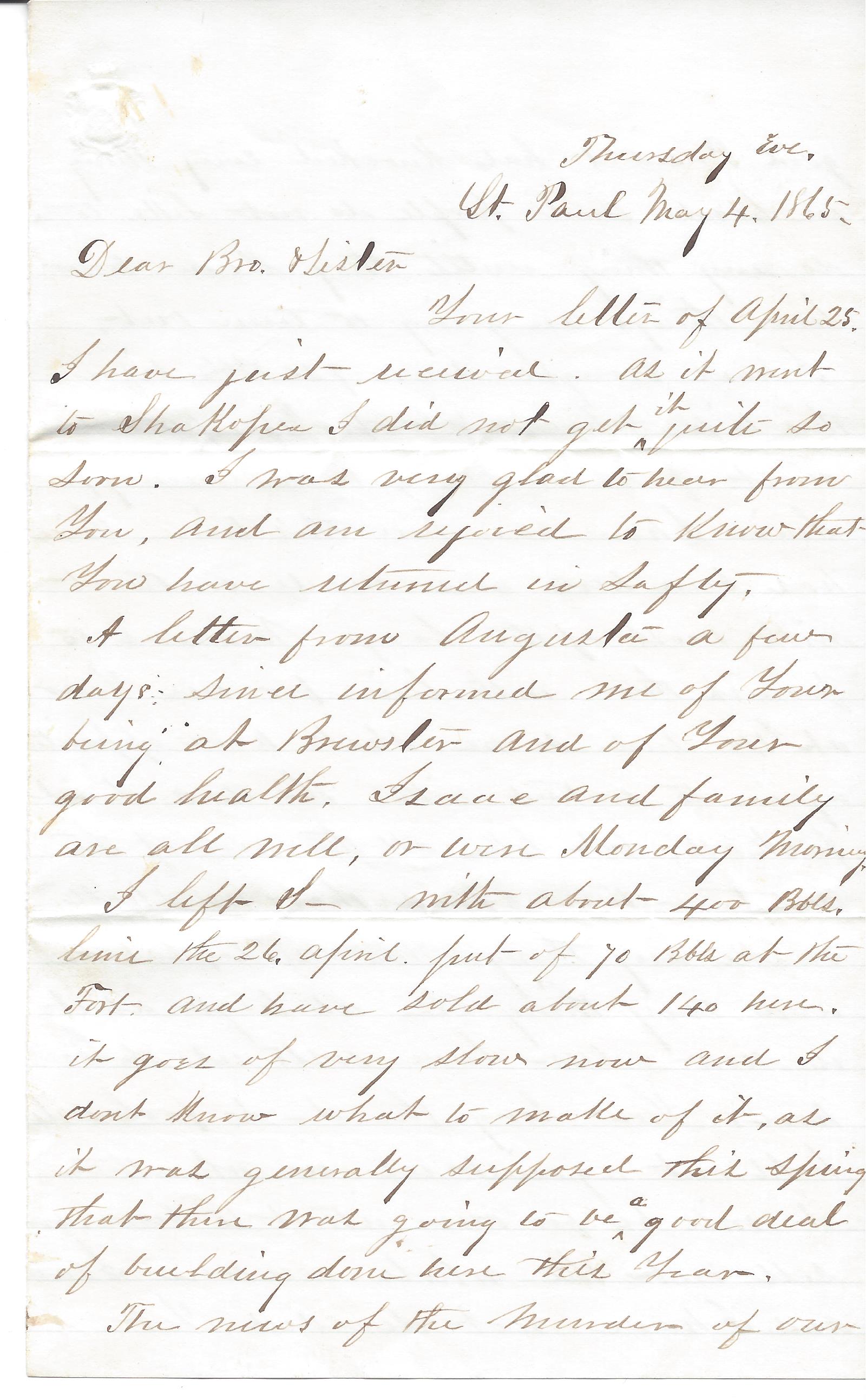
-
Description
This letter from Edgar to his brother and sister discussing his recent activities near St. Paul, Minnesota, including the assassination of President Lincoln. Edgar notes that the news of Lincoln's death has stunned the local populace. Edgar goes on to note that he is willing to follow his brother in regards to management of land they hold in Minnesota, that he feels may drive him into debt.
-
Source
-
Rights
This item may be reproduced and used for any purpose, including research, teaching, private study, publication, broadcast or commercial use, with proper citation and attribution.
-
Creator
Edgar Lincoln
-
Date
May 4, 1865
from Apr. 27, 1865
Joseph Lincoln Letter to Wife
-
Full Title
Joseph Lincoln Letter to Wife
-
Description
This letter from Captain Joseph Lincoln to his wife talks about his experiences as a merchant sea captain towards the end of the Civil War. Captain Lincoln mentions the death of John Wilkes Booth in his letter as well as his hope that the assassin would have been taken alive.
-
Transcription
Boston April 27th /65
My Dear Wife,
Have been looking for a letter from you yesterday & to day, but none
came. suppose that you are busy getting ready for another voyage. do not know where
she will go the next voyage, but there is some talk of her going to Philadelphia. to
load coal for New Orleans, if so think you had better go as far as Philadelphia with
me. If the weather continues good shall be all discharged by Saturday night. then
I suppose it will be driving times till they get her away. Have not settled with them
yet but see that they have the voyage made up and charged me the rate of exchange
on all money drawn away. Which bring me in debt to the ship. instead of having
5 or $600 coming to me, but I do not think that is the way they intend to settle with
me, if they do I want to make one more voyage for them and pay myself, that I should
call mean enough would make my wages less then $40 pr month Sailors are getting $50.
but will say no more till I know what they intend to do. to day we have the news that
they have got Booths body which is good. but was in hopes they would have taken him
alive. Write me so that I can get it Saturday night to the Webster House, Emma has a
little girl
Yours affectionate
Husband
Joseph L. Lincoln -
Source
-
Rights
This item may be reproduced and used for any purpose, including research, teaching, private study, publication, broadcast or commercial use, with proper citation and attribution.
-
Tags
-
Cite this Item
Joseph Lincoln. "Joseph Lincoln Letter to Wife". Remembering Lincoln. Web. Accessed December 16, 2025. https://rememberinglincoln.fords.org/node/844
-
Creator
Joseph Lincoln
-
Date
April 27, 1865
from Apr. 27, 1865
Joseph Lincoln Letter to Wife
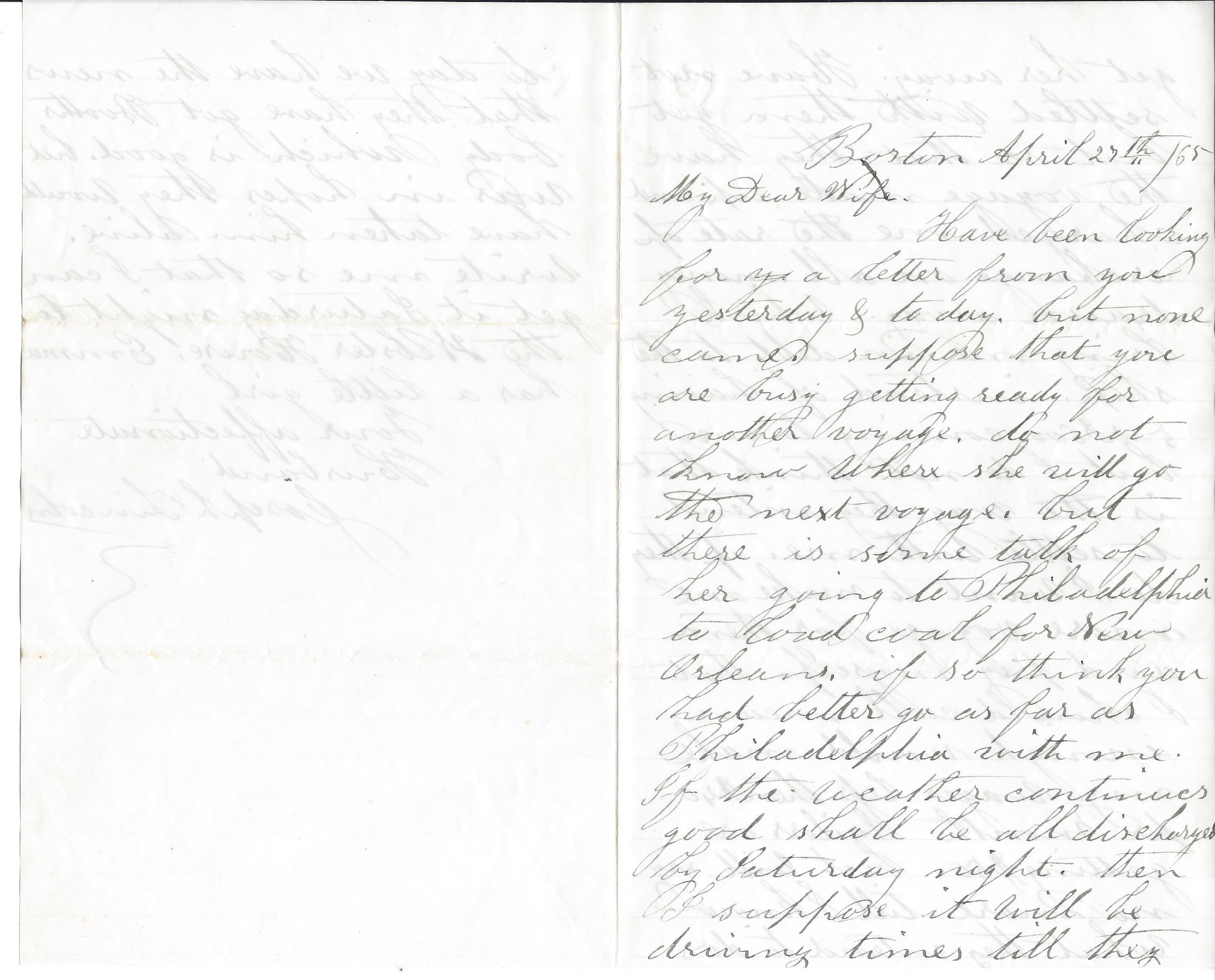
-
Description
This letter from Captain Joseph Lincoln to his wife talks about his experiences as a merchant sea captain towards the end of the Civil War. Captain Lincoln mentions the death of John Wilkes Booth in his letter as well as his hope that the assassin would have been taken alive.
-
Source
-
Rights
This item may be reproduced and used for any purpose, including research, teaching, private study, publication, broadcast or commercial use, with proper citation and attribution.
-
Creator
Joseph Lincoln
-
Date
April 27, 1865
from
Joanna Lane's original "Lincoln Memories" letter
-
Full Title
Joanna Lane's original "Lincoln Memories" letter
-
Description
Page three of the original, handwritten "Lincoln Memories" letter by Mrs. Henry S. Lane Feb 1909
-
Transcription
Many unjust criticisms have been cast upon Mrs. Lincoln while in the White House. She made a great mistake soon after going there when the newspapers reported she was to give a large ball in the East room - but Secretary Seward and other judicious advisers persuaded her to omit the dancing and have only the ordinary reception. This was early in the war and the public conscience was shocked with this appearance of levity and indifference to the weeping and wailing all around us. Mrs. Lincoln was born in Ky and had succession relatives there but she was true to her husband and country loyal to the country but unhappily could not attach women to her, was cold and unresponsive in temperament.
-
Source
Montgomery County Historical Society
-
Rights
Use of this item for research, teaching, and private study is permitted with proper citation. Reproduction of the item requires our written permission for publication, broadcast or commercial use. Request for such must be made in writing, outlining in detail the items to be reproduced and requested use of the reproduction. For permission, please contact Victoria Johnston at vjohnston@lane-mchs.org.
-
Tags
-
Cite this Item
Joanna Lane. "Joanna Lane's original "Lincoln Memories" letter". Remembering Lincoln. Web. Accessed December 16, 2025. https://rememberinglincoln.fords.org/node/828
from
Joanna Lane's original "Lincoln Memories" letter
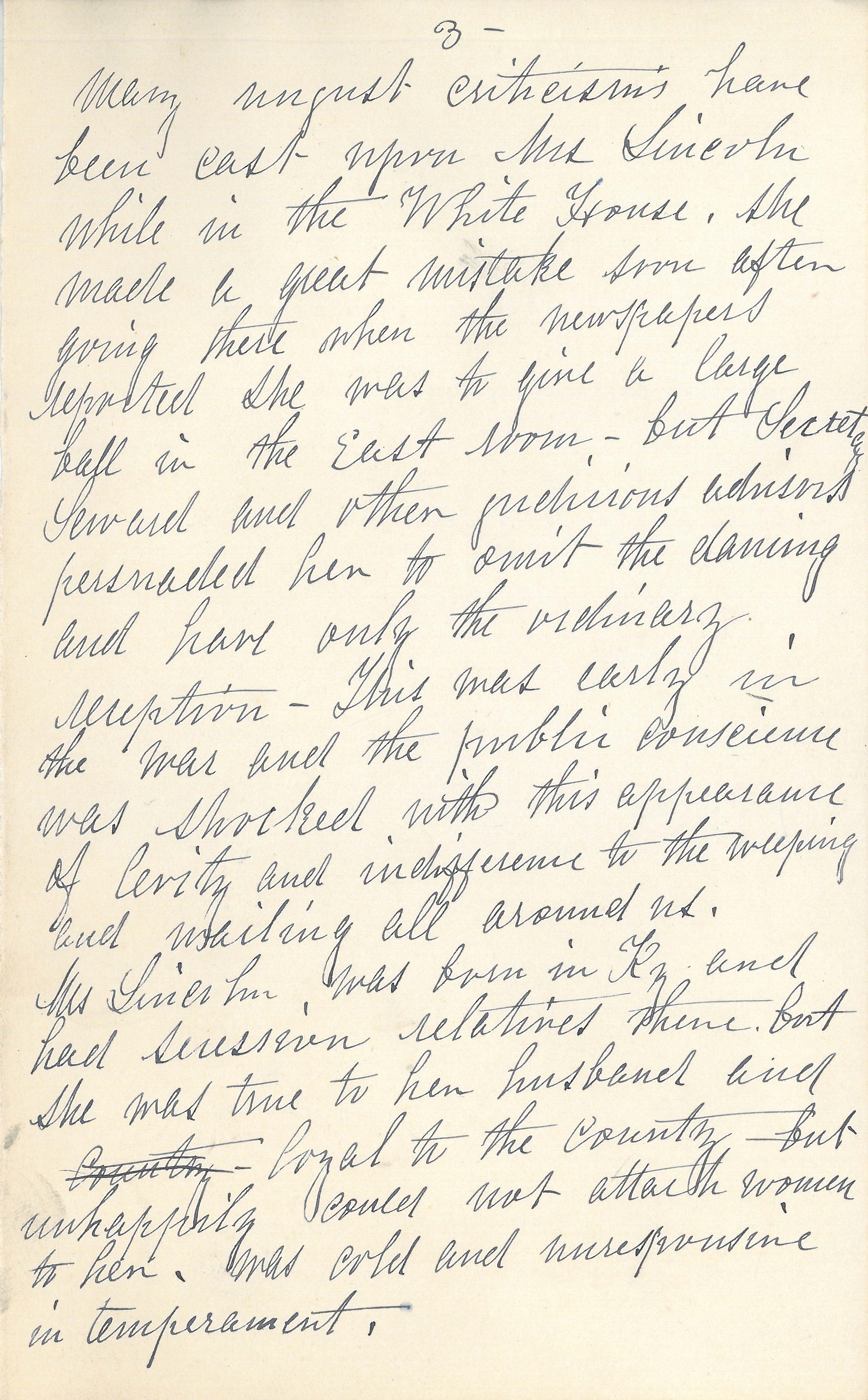
-
Description
Page three of the original, handwritten "Lincoln Memories" letter by Mrs. Henry S. Lane Feb 1909
-
Source
Montgomery County Historical Society
-
Rights
Use of this item for research, teaching, and private study is permitted with proper citation. Reproduction of the item requires our written permission for publication, broadcast or commercial use. Request for such must be made in writing, outlining in detail the items to be reproduced and requested use of the reproduction. For permission, please contact Victoria Johnston at vjohnston@lane-mchs.org.
-
Creator
Joanna Lane
from
Joanna Lane's original "Lincoln Memories" letter
-
Full Title
Joanna Lane's original "Lincoln Memories" letter
-
Description
Page one of the original, handwritten "Lincoln Memories" letter by Mrs. Henry S. Lane Feb 1909
-
Transcription
The Swiss Government in passing resolutions of condolence on the death of Lincoln said "he was the man with the brow of iron, and the heart of gold. These were words fitly spoken and all who ever came in contact with him recognized the divine charity which forgives all sin and pities all suffering. If he ever erred it was on the side of mercy in pardoning rebels whom others had convicted and thought guilty of severe punishment many women came to him during that awful war of Rebellion asking him to commute the sentence passed upon a beloved husband or son. Always their requests were granted
-
Source
Montgomery County Historical Society
-
Rights
Use of this item for research, teaching, and private study is permitted with proper citation. Reproduction of the item requires our written permission for publication, broadcast or commercial use. Request for such must be made in writing, outlining in detail the items to be reproduced and requested use of the reproduction. For permission, please contact Victoria Johnston at vjohnston@lane-mchs.org.
-
Tags
-
Cite this Item
Joanna Lane. "Joanna Lane's original "Lincoln Memories" letter". Remembering Lincoln. Web. Accessed December 16, 2025. https://rememberinglincoln.fords.org/node/827
from
Joanna Lane's original "Lincoln Memories" letter
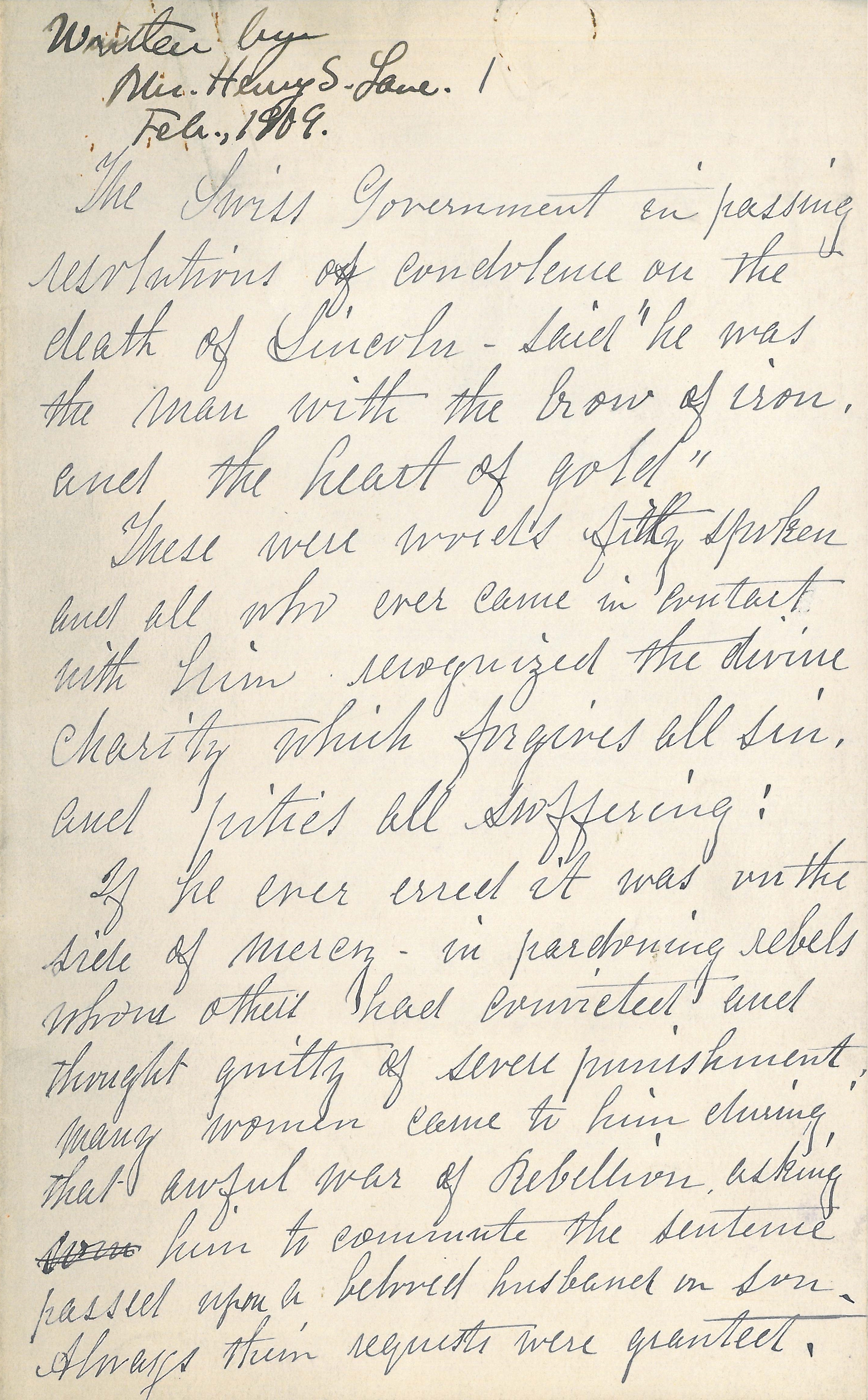
-
Description
Page one of the original, handwritten "Lincoln Memories" letter by Mrs. Henry S. Lane Feb 1909
-
Source
Montgomery County Historical Society
-
Rights
Use of this item for research, teaching, and private study is permitted with proper citation. Reproduction of the item requires our written permission for publication, broadcast or commercial use. Request for such must be made in writing, outlining in detail the items to be reproduced and requested use of the reproduction. For permission, please contact Victoria Johnston at vjohnston@lane-mchs.org.
-
Creator
Joanna Lane
from
"Lincoln Memories"
-
Full Title
"Lincoln Memories"
-
Description
Joanna Lane remembers Abraham Lincoln in her "Lincoln memories" after his assassination.
-
Transcription
“Lincoln” Memories – By Mrs. Henry S. Lane
The Swiss Government in passing resolutions of condolence on the death of Lincoln said – “he was the man with the brow of iron and the heart of gold”.
These were words fitly spoken and all who ever came in con-tact with him recognized the divine charity which forgives all sin and pities all suffering.
If he ever erred it was on the side of mercy in pardoning rebels whom others had convicted and thought guilty of severe pun-ishment. Many women came to him during that awful War of Rebel-lion asking him to commute the sentence passed upon a beloved hus-band or son. Always their request were granted.
After the battle of Shiloh, April 6-7, 1862, the report came to Washington that Lew Wallace was killed in that terrible slaught-er. Mr. Lane hearing it went up to inquire of Sen. Stanton it was true- he found President Lincoln there at the War office on the same errand. Later they learned it was Wallace from Illinois who had been killed. Mr. Lane said he was thankful it was not our Wallace. But, replied Mr. Lincoln, “it was somebody’s Wallace.” He sympathized with all who mourned the death of this true patriot in that fearful battle. As you have heard many times, his distinguishing characteristics were gentleness and humility.
Many unjust criticisms have been cast upon Mrs. Lincoln while in the Whits House. She made a great mistake soon after going there where the newspapers reported she was to give a large ball in the East room-but Secretary Seward and other judicious advisors persuaded her to omit the dancing and have only the ordinary re-ception. This was early in the War and the public conscience was shocked with this appearance of levity and indifference to the weeping and wailing all around us.
[Transcription by Alicia B., Ford's Theatre Society.] -
Source
Montgomery County Historical Society
-
Rights
Use of this item for research, teaching, and private study is permitted with proper citation. Reproduction of the item requires our written permission for publication, broadcast or commercial use. Request for such must be made in writing, outlining in detail the items to be reproduced and requested use of the reproduction. For permission, please contact Victoria Johnston at vjohnston@lane-mchs.org.
-
Tags
-
Cite this Item
Joanna Lane. ""Lincoln Memories"". Remembering Lincoln. Web. Accessed December 16, 2025. https://rememberinglincoln.fords.org/node/822
from
"Lincoln Memories"
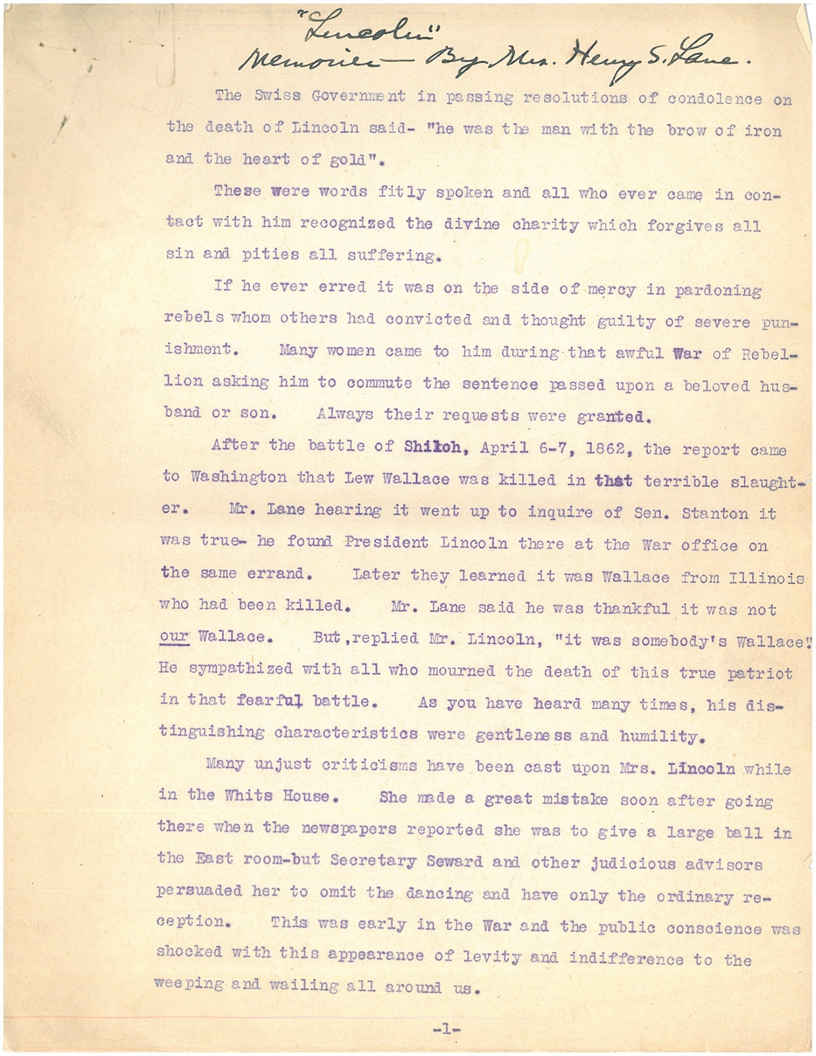
-
Description
Joanna Lane remembers Abraham Lincoln in her "Lincoln memories" after his assassination.
-
Source
Montgomery County Historical Society
-
Rights
Use of this item for research, teaching, and private study is permitted with proper citation. Reproduction of the item requires our written permission for publication, broadcast or commercial use. Request for such must be made in writing, outlining in detail the items to be reproduced and requested use of the reproduction. For permission, please contact Victoria Johnston at vjohnston@lane-mchs.org.
-
Creator
Joanna Lane
from Apr. 15, 1865
James S. Knox to his Father
-
Full Title
James S. Knox to his Father
-
Description
James S. Knox, a witness to the assassination, writes a detailed letter to his father describing the event, as well as the attacks at the Seward home, and the national feeling, saying that "the nation is aroused and terrible will be its vengeance."
-
Transcription
Ac 9360
Washington, DC
April 15, 1865
Dear Father,
It is with sad feeling that I take up my pen to address you. Last Friday night at 10 oclock, I witnessed the saddest tragedy ever was had in this country. Notwithstanding my promise to you not to visit the theatre, I cannot resist the temptation to see General Grant and the President, and when the curtain at Ford’s rose on the play of Our American Cousin my room mate and I were seated on the second row of the orchestra seats, just beneath the President’s box. The President entered the theatre at 8 ½ o’ck, amid deafening cheers and the rising of all. Everything was cheerful, and never was our magistrate more enthusiastically welcomed. Or more happy. Many pleasant allusions were made to him in the play, to which the audience gave deafening responses, while Mr. Lincoln laughed heartily and beamed frequently to the gratified people. Just after the 3rd Act, and before the scenes were shifted, a muffled pistol shot was heard, and a man sprang wildly from the national box, partially tearing down the flag, then shouting “ ‘sic semper tyrannis’, the south is avenged “ with brandished dagger, rushed across the stage and disappeared. The whole theatre was paralyzed. But two men sprang for the stage, a Mr. Stewart and myself. Both of us were familiar with the play, and suspected the fearful tragedy. We rushed after the murderer, and Mr. Stewart being familiar with the passages, reached the rear door in time to see him spring on his horse and ride off – I became lost amid the scenery and was obliged to return. My roommate had followed me and secured the murderer’s hat. The shrill cry of murder from Mrs. Lincoln first roused the horrified audience, and in an instant the uproar was terrible. The silence of death was broken by shouts of “kill him”, “hang him” and strong men wept and cursed, and tore the seats in the impotence of their anger, while Mrs. Lincoln, on her knees uttered shriek after shriek at the feet of the dying President. Finally the theatre was cleared and the President removed. Still greater was the excitement in the city. Rumors of the murder of Sec’y Seward and his son reached us as we gained the street – Mounted patrols dashed everywhere, bells tolled the alarm, and excited crowds rushed about the avenues, Despair was on every countenance, and black horror brooded over the city. Until long after midnight I was detained at Police Hd.Qrs., giving my evidence, and when I sought my room, in a distant part of the city – dark clouds had gathered in the heavens, and soldiers sternly paced their patrol. May I never see another such night. I could not sleep. I could only think, (but?) thought was weary, and in despair thought again.
Yesterday morning the President died. At 8 ½ ock, the kindest, noblest, truest heart ceased to beat, and Abraham Lincoln was dead. Let no man ever speak to me again about Southern Chivalry, or talk in sympathy with traitors. The events of last night can never be forgotten and while there is strength in my arm, I never can, never will, endure it – nor am I alone – the nation is aroused and terrible will be its new glower, Treason, pardoned, forgiven, patiently dealt with by our president, viper like, has stung the breast, that kindly treated it, and the traitor South has slain its bravest, noblest friend. Bitter, bitter will be the tears of repentance. But I cannot write of it – Andrew Johnson has been sworn, His speech was simple, “The duties now are mine, the results are God’s”. I trust he may perform his task faithfully, but, oh, for the Confidence, and the hope that we had in Lincoln, like a ship without a rudder is the nation tossed. Outwardly are we quiet, but in each heart, what horror, misgivings and despair-
But I must cease – (Lolita?) & Will R – left here Friday night. I presume by this time they are with you. By them you can learn of me better than I can write. Love to all.
Your affect son
James Knox
[Transcription by Dale Anderson.] -
Source
-
Rights
This item is in the public domain and may be reproduced and used for any purpose, including research, teaching , private study, publication, broadcast or commercial use, with proper citation and attribution
-
Tags
-
Cite this Item
James S. Knox. "James S. Knox to his Father". Remembering Lincoln. Web. Accessed December 16, 2025. https://rememberinglincoln.fords.org/node/753
-
Creator
James S. Knox
-
Date
April 15, 1865
from Apr. 15, 1865
James S. Knox to his Father
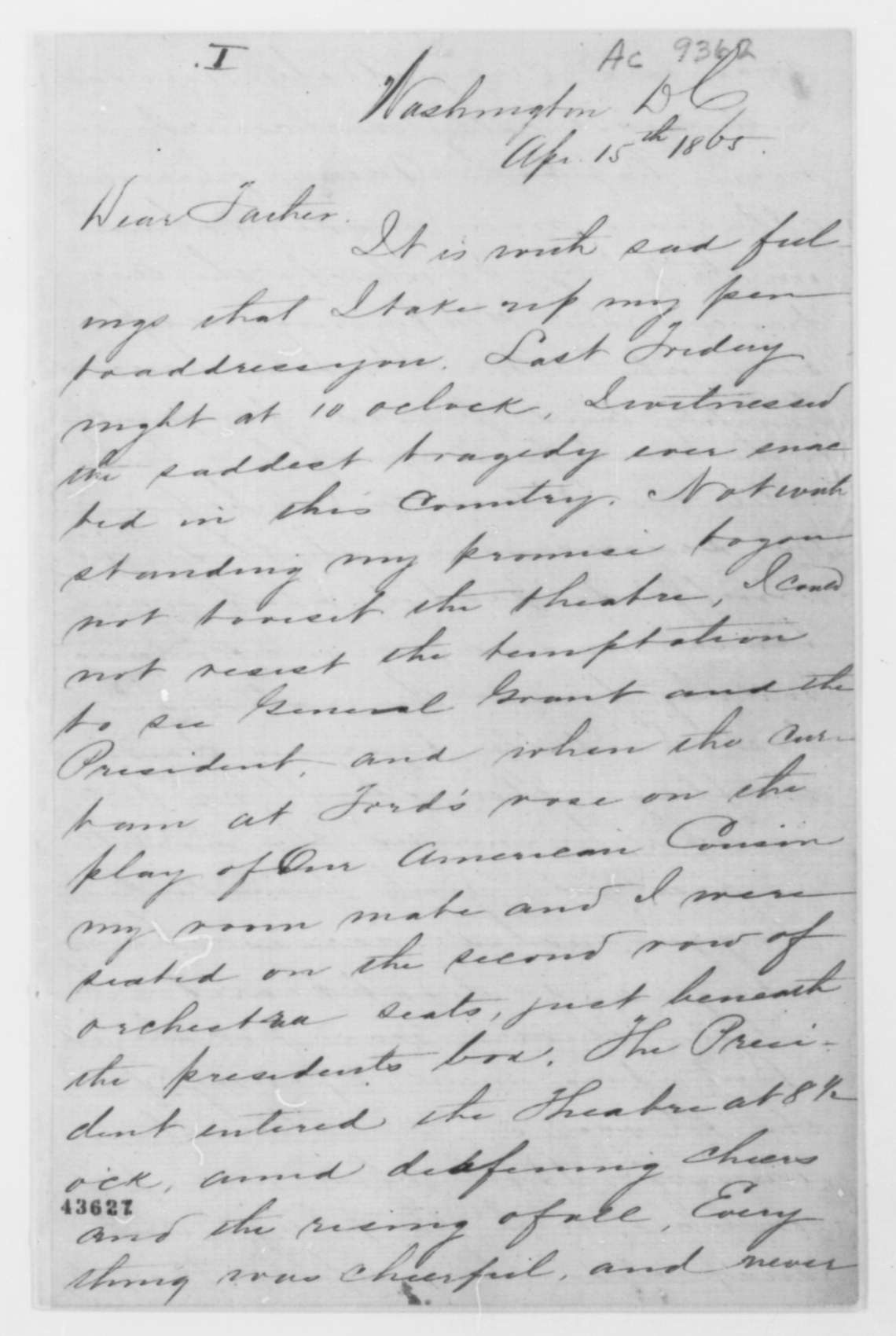
-
Description
James S. Knox, a witness to the assassination, writes a detailed letter to his father describing the event, as well as the attacks at the Seward home, and the national feeling, saying that "the nation is aroused and terrible will be its vengeance."
-
Source
-
Rights
This item is in the public domain and may be reproduced and used for any purpose, including research, teaching , private study, publication, broadcast or commercial use, with proper citation and attribution
-
Creator
James S. Knox
-
Date
April 15, 1865
from May. 2, 1865
Dispatch: William Hunter to Charles Francis Adams
-
Full Title
State Department Instruction 1383: William Hunter to Charles Francis Adams
-
Description
Dispatch from Acting Secretary of State William H. Hunter to Charles Francis Adams, U.S. Minister to the United Kingdom, concerning the latest news about the funeral of the assassinated President Abraham Lincoln (his body was in Chicago), the death of assassin John Wilkes Booth, and the surrender of Confederate General Joseph Johnston.
-
Transcription
Recd 14 May 1865
No 1383 Department of State Washington, 2nd May 1865
Sir:
The public press will have informed you of the honor done by the people to the remains of our lamented President on their transit of this city to Chicago which point they have now reached. The assassination, and the other atrocious attempt, have called forth gratifying expressions of condolence and sympathy from foreigners resident in the United States and from the Government and many of the cities of Canada.
With reference to military events I will mention that Macon Georgia was captured by General Wilson on the 13th ultimo when he was notified by Genl Sherman of the truce and withdrew.
When the truce between General Sherman and Johnston and the proposed terms of surrender were reported
Charles Francis Adams Esqre
[Transcription by: Taryn S. and her father David, Mr. Rude’s class, New Hampton Middle School, New Hampton, Iowa.]
-
Source
Office of the Historian, U.S. Department of State and National Archives, Record Group 84
-
Rights
This item is in the public domain and may be reproduced and used for any purpose, including research, teaching, private study, publication, broadcast or commercial use, with proper citation and attribution.
-
Tags
-
Cite this Item
William Hunter. "State Department Instruction 1383: William Hunter to Charles Francis Adams". Remembering Lincoln. Web. Accessed December 16, 2025. https://rememberinglincoln.fords.org/node/748
-
Creator
William Hunter
-
Date
May 2, 1865
from May. 2, 1865
State Department Instruction 1383: William Hunter to Charles Francis Adams
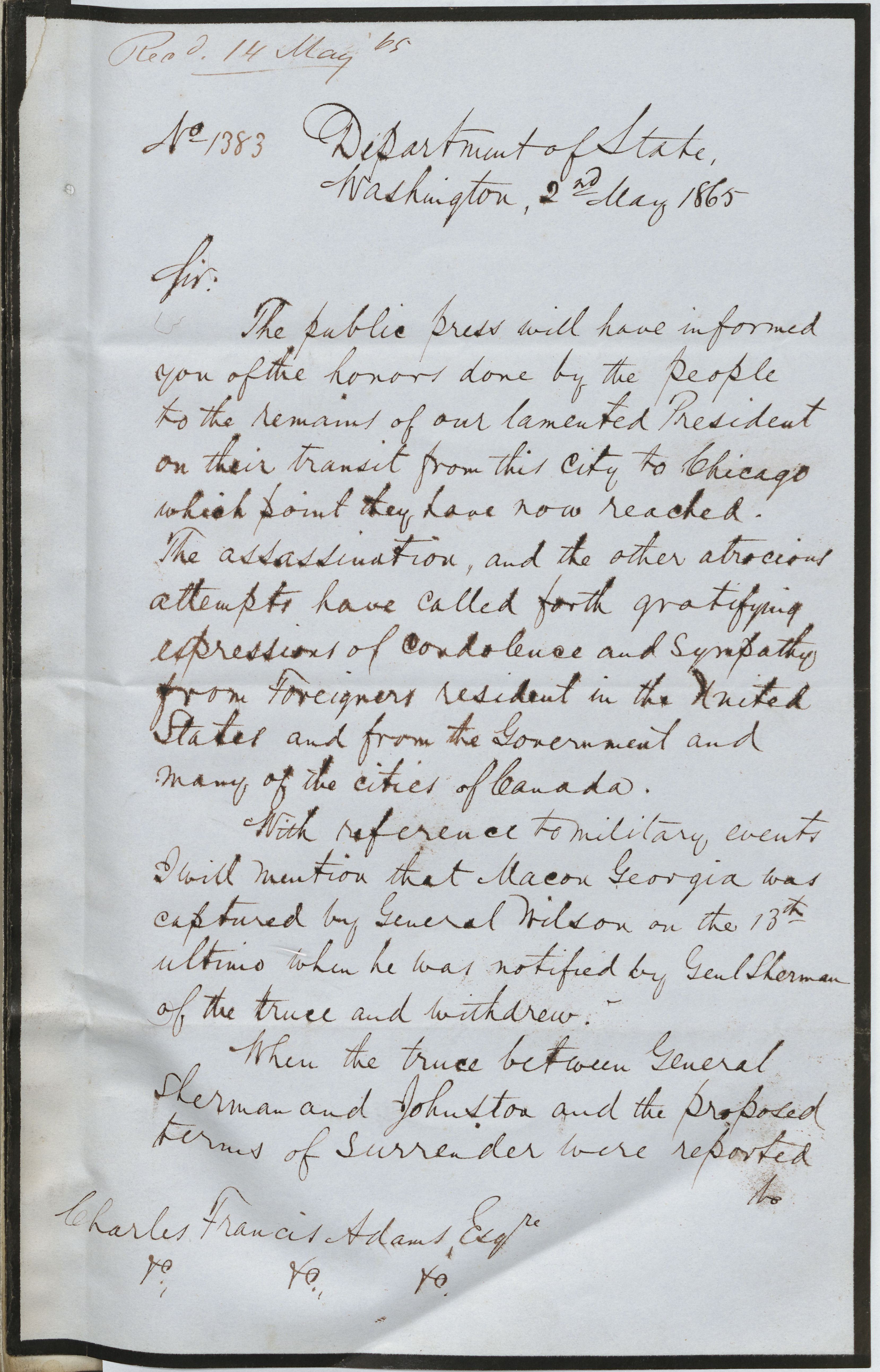
-
Description
Dispatch from Acting Secretary of State William H. Hunter to Charles Francis Adams, U.S. Minister to the United Kingdom, concerning the latest news about the funeral of the assassinated President Abraham Lincoln (his body was in Chicago), the death of assassin John Wilkes Booth, and the surrender of Confederate General Joseph Johnston.
-
Source
Office of the Historian, U.S. Department of State and National Archives, Record Group 84
-
Rights
This item is in the public domain and may be reproduced and used for any purpose, including research, teaching, private study, publication, broadcast or commercial use, with proper citation and attribution.
-
Creator
William Hunter
-
Date
May 2, 1865
from May. 1, 1865
Earl Russell to Adams
-
Full Title
Foreign Minister Earl Russell to Minister Charles Francis Adams
-
Description
A letter from Earl Russell, Foreign Minister of the United Kingdom, to Charles Francis Adams, U.S. Minister to the United Kingdom, acknowledging receipt of the official news of Lincoln's assassination and expressing his government's condolences.
-
Transcription
“Foreign Minister Earl Russell to Minister Charles Francis Adams”
Read. 2^[[d]] May, 1865.
Foreign Office
May 1. 1865.
Sir,
I have had the honour to receive
your note of this day’s date, officially
communicating to me the mealancholy
intelligence of the death, by the
hand of an assassin, of the Late
President of the United States.
When the first intelligence of
this had calamity reached this
country I [[convade]] to you by letter
and in person the deep impression
of horror and indignation which
Thanks Francis Adams Log
so atrocious a crime on the [[person]]
of the President of the United States
had made upon me and on the [[general]]
members of Her Majesty’s Government;
And it only [[remains]] for me now,
[[by]] acknowledging your letter, &
[[acquaint]] you that, by the command
of the Queen, I have directed Her
Majesty's Minister at Washington
to [[conoly]] to the government of the of the
United States the appearance that
Her Majesty sincerely condoles with
the family of the late President, and
that Her
Her Majesty’s Government and the
British Parliament and the British
Nation are affected by an unanimous
feeling of abhorrence of the
criminal guilty of this cowardly
and atrocious assassination, and
of their sympathy with the
Government and People of the
United States under the [[freak]]
calamity which has befallen them.
I have the honor to be with the
[[highest]] [[consideration]],
Sir,
Your [[British]] President,
Humble Servant,
Russell
[Transcription by: Alexis Ennis, Rachel Engl’s class, Lehigh University.] -
Source
Ford's Theatre National Historic Site, FOTH 3369, and National Archives, Record Group 84
-
Rights
This item is in the public domain and may be reproduced and used for any purpose, including research, teaching, private study, publication, broadcast or commercial use, with proper citation and attribution.
-
Tags
-
Cite this Item
John Russell, First Earl Russell. "Foreign Minister Earl Russell to Minister Charles Francis Adams". Remembering Lincoln. Web. Accessed December 16, 2025. https://rememberinglincoln.fords.org/node/747
-
Creator
John Russell, First Earl Russell
-
Date
May 1, 1865
from May. 1, 1865
Foreign Minister Earl Russell to Minister Charles Francis Adams
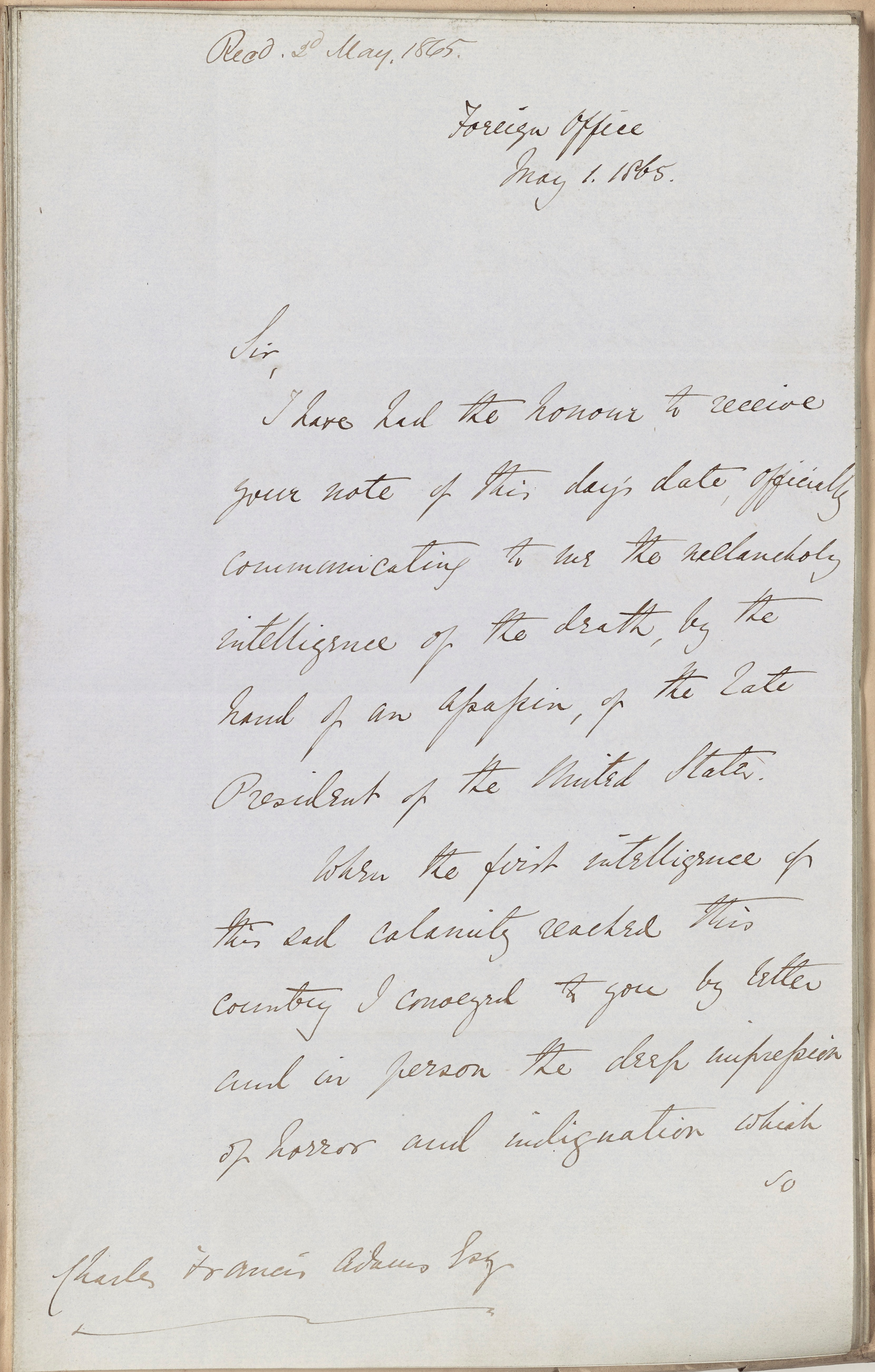
-
Description
A letter from Earl Russell, Foreign Minister of the United Kingdom, to Charles Francis Adams, U.S. Minister to the United Kingdom, acknowledging receipt of the official news of Lincoln's assassination and expressing his government's condolences.
-
Source
Ford's Theatre National Historic Site, FOTH 3369, and National Archives, Record Group 84
-
Rights
This item is in the public domain and may be reproduced and used for any purpose, including research, teaching, private study, publication, broadcast or commercial use, with proper citation and attribution.
-
Creator
John Russell, First Earl Russell
-
Date
May 1, 1865
from May. 1, 1865
Charles Francis Adams to Foreign Minister Earl Russell
-
Full Title
Charles Francis Adams to Foreign Minister Earl Russell
-
Description
Letterbook copy of dispatch from Charles Francis Adams, U.S. Minister to the United Kingdom, to John Russell, First Earl Russell, Foreign Minister of the United Kingdom, informing him of Lincoln's assassination.
-
Source
Office of the Historian, U.S. Department of State, and National Archives, Record Group 84
-
Rights
This item is in the public domain and may be reproduced and used for any purpose, including research, teaching, private study, publication, broadcast or commercial use, with proper citation and attribution.
-
Tags
-
Cite this Item
Charles Francis Adams. "Charles Francis Adams to Foreign Minister Earl Russell". Remembering Lincoln. Web. Accessed December 16, 2025. https://rememberinglincoln.fords.org/node/746
-
Creator
Charles Francis Adams
-
Date
May 1, 1865
from May. 1, 1865
Charles Francis Adams to Foreign Minister Earl Russell

-
Description
Letterbook copy of dispatch from Charles Francis Adams, U.S. Minister to the United Kingdom, to John Russell, First Earl Russell, Foreign Minister of the United Kingdom, informing him of Lincoln's assassination.
-
Source
Office of the Historian, U.S. Department of State, and National Archives, Record Group 84
-
Rights
This item is in the public domain and may be reproduced and used for any purpose, including research, teaching, private study, publication, broadcast or commercial use, with proper citation and attribution.
-
Creator
Charles Francis Adams
-
Date
May 1, 1865
